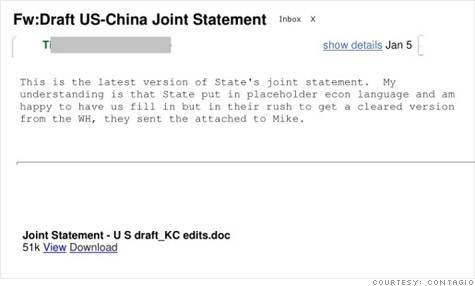I am wondering what people here think of our country's (USA) ability to conduct cyber war....
Personally, I think we would have all of our infrastructure and private businesses that operate critical facilities (power, natural resources, all communication) shut down within the first day of cyberware against any skilled opponent, and when people can't email or make phone calls there will be anarchy.
Not hard to find intelligence reports and even mainstream journalists have reported on the 'patriotic hackers' - private companies who hack into other countries or international businesses, steal info, and then sell them back to their government - inside countries like china and russia. It is also no secret that China is quietly building itself to become the world's #1 power during and after the next big war. Not only are they capable in the conventional military sense, but they also have the largest group of skilled hackers for cyber offense, as well as strictly controlled internet access for the entire country. They will be able to shut off at will any sectors compromised by would be attackers and move on to other areas.
Almost all of their defenses strategies are strictly unconstituional, but I think something needs to be to better bridge the gap between private companies and even the government itself. Unfortunately, the urgency of this matter has brought about the "cybersecurity act of 2009", which most people will remember as giving the president power to shut down internet connections of priv businesses and gov (just like china has), since we have no real plan in place and only drastic measures can shore us up until its fixed. Most of the effort to get security rolling has been given to NSF and other grant giving instutions, meaning any serious change at a national level is 7 years away at the very least, and much of the "research" will give no real results.
I believe that until the USA takes cyber warefare as serious as it takes the other branches of the military, that no matter how many planes and tanks we have, we are only a few MB of traffic away from complete destruction.
Personally, I think we would have all of our infrastructure and private businesses that operate critical facilities (power, natural resources, all communication) shut down within the first day of cyberware against any skilled opponent, and when people can't email or make phone calls there will be anarchy.
Not hard to find intelligence reports and even mainstream journalists have reported on the 'patriotic hackers' - private companies who hack into other countries or international businesses, steal info, and then sell them back to their government - inside countries like china and russia. It is also no secret that China is quietly building itself to become the world's #1 power during and after the next big war. Not only are they capable in the conventional military sense, but they also have the largest group of skilled hackers for cyber offense, as well as strictly controlled internet access for the entire country. They will be able to shut off at will any sectors compromised by would be attackers and move on to other areas.
Almost all of their defenses strategies are strictly unconstituional, but I think something needs to be to better bridge the gap between private companies and even the government itself. Unfortunately, the urgency of this matter has brought about the "cybersecurity act of 2009", which most people will remember as giving the president power to shut down internet connections of priv businesses and gov (just like china has), since we have no real plan in place and only drastic measures can shore us up until its fixed. Most of the effort to get security rolling has been given to NSF and other grant giving instutions, meaning any serious change at a national level is 7 years away at the very least, and much of the "research" will give no real results.
I believe that until the USA takes cyber warefare as serious as it takes the other branches of the military, that no matter how many planes and tanks we have, we are only a few MB of traffic away from complete destruction.



